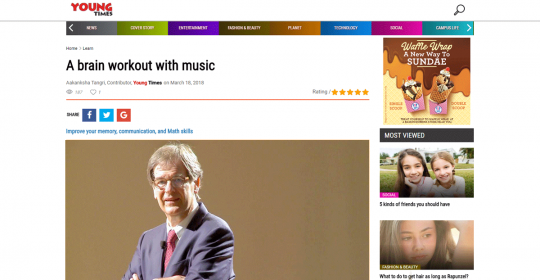
How Music Makes You Smarter
You’ve probably had your parents tell you to stop listening to so much music, but the right kind of music can actually have a positive impact on your brain. Dr. Manio von Maravic, neurologist, German Neuroscience Center, Dubai has spent a part of his illustrious career studying how the brain actually reacts to music.
Dr. Maravic equates listening to music to a brain workout as it requires the coordination of all areas of the brain, “Your ears send the music in the form of electronic nerve signals to different lobes of the brain, and each of those lobes have a complex job — to understand those signals and put the information together so that, at the end of this process, you are able to hear the music.” The brain enables you to feel a wide-range of emotions and understand the rhythm of each musical piece.
“When you’re listening to music, the brain is in an activated state, and this activation might help you to perform better in your daily life as it exercises your brain,” he explains.
Listening to music and learning to play a musical instrument also impacts your abilities to memorise, learn and concentrate. It can also improve brain functions, including reading and literacy skills as well as mathematical abilities. “We’ve found that listening to positive music or playing an instrument can actually help you learn better. The rhythm inherent in music also stimulates the cerebellum, which is the part of the brain that helps in coordinating your movements. Hyperactive kids have done better on schools tests when they listened to soothing music beforehand,” he tells us. If you’ve listened to the same upbeat song on a loop and still can’t get enough of it, it’s because listening to positive music also causes your brain to produce a specific hormone called dopamine. This hormone is required by the brain to stimulate positive feelings like happiness and love. But, the key to all this is listening to the right kind of music.
“If you’re already in a bad mood, listening to sad songs will just enhance those feelings,” he says. “Negative lyrics can manipulate your feelings and provoke aggression, which might make it difficult to focus,” he adds.
“Listening to positive music or playing an instrument can actually help you learn better.” – Dr. Manio von Maravic, neurologist, German Neuroscience Center, Dubai
Also, your parents are right when they ask you to not blast music while you have headphones on. Listening to music at a high volume can damage your hearing ability. “Hearing loss due to the use of headphones in this way has become more frequent,” he warns. Soothing music can help students relax and help with stress and anxiety while studying, but listening to songs that are heavy on lyrics while reading or writing tends to be less efficient. Dr. Maravic says that positive music — like listening to Mozart — can also aid with endurance during your long study sessions.
He encourages Young Times readers to learn an instrument to activate the part of their brain that controls motor skills and memory. Being a musician also improves communication skills as you are working with other musicians to create your masterpieces. Further, it can help your Math skills because reading music requires you to count notes and rhythms. “Learn to love music from all cultures and make music a part of your life. This can help to bring the world together and create friendships independent of cultural and national differences,” he advises.
The Article was originally published in Young Times by Aakanksha Tangri, March 18, 2018

